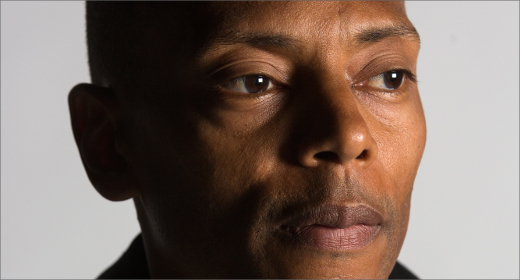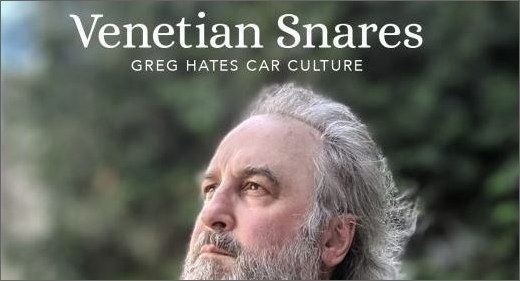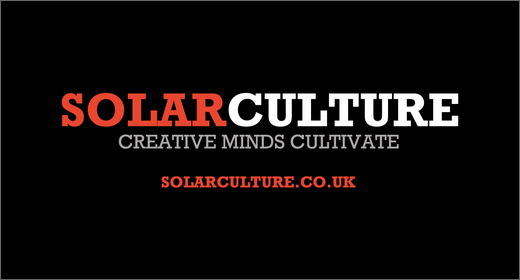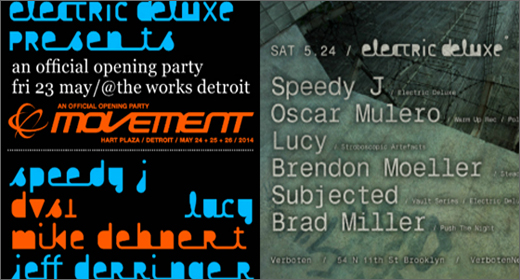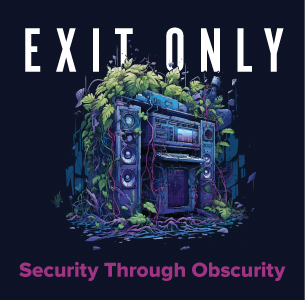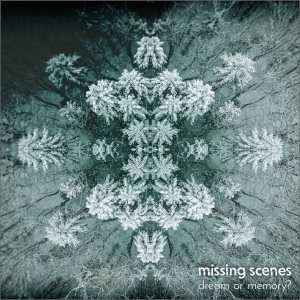30 years ago, he was the co-founder of Underground Resistance, a pioneering collective hailing from Detroit and definer of the techno groove we nowadays find self-evident. Today, he is an ever more respected contemporary composer blending classical and electronics. Revered DJ, hypnotic virtuoso of the Roland TR-909 drum machine but first and foremost a conceptualist; unlike many, Jeff Mills has not proven unworthy of his title of living legend. On the occasion of the presentation in Monaco of “Weapons,” his exhibit made of futuristic artifacts, this is a rare interview with he who has always been planning everything that awaits us.

Christopher Mathieu :: You have gradually evolved from having your music played by orchestras to actually creating your own orchestral pieces yourself. What has been your process? Did you have to delve further into music theory in order to do that?
Jeff Mills :: Yes, I had quite a lot of research to do to better understand the level of which I was trying to work in, starting from how an orchestra works with the limitations and the ability of each musician, what instruments can actually do and what musicians can do to them, and then take that information back and have a better idea of how to write the original compositions. It’s not a good thing to have musicians with nothing to do, right? So each piece has to be written with the idea that everyone is going to play at some point or have some role to play in the composition. So I had to learn all that and keep an eye on what classical music has gone through and what is currently being considered as a new type of music and things like that, and just become more immersed into the genre to better understand it. That and also looking for other examples in terms of how to translate concepts and studying films and other productions to get an idea of how I need the audience to feel at certain times, borrowing things from dance music in the way that we set people up to hear one thing and then another thing comes and the one-two punch and all those type of things, you kinda pull from all the things that you know.
You cannot ignore how few Black composers have been acknowledged. Is there a part of you that wishes to break from the usual conception that Black people belong in given genres such as jazz, r’n’b… Do you try to make it a mission somehow?
No! I live and think beyond that. I think people that make a big deal out of it are the ones that really need to because they need to have this type of class structure based on this and based on that. I think that I’m lucky enough to have the ability to be able to see beyond my community, beyond my country, beyond race. I’ll only really remember these things when I’m reminded by them. When I’m sitting in the studio and I’m working, there is nothing to do with color. Or, when I’m sitting in front of a keyboard and I’m thinking of two planets colliding, it has nothing to do with Africa, it has nothing to do with America or else. No, I think in a positive way. The fact that all my ancestry history has been taken away allows me to be able to reinvent and recreate and build my life around me at this moment. And if I choose to mostly focus on the future and not the past, I feel just as comfortable with that. Some people might have a problem thinking very far in advance because it becomes not clear, because it’s so much chance, it’s so much consequence. But actually, I feel just as comfortable looking forward than I do looking back. So I can dream unconditionally and work to translate these ideas unconditionally.
10 years ago, you did a live rendition of X-102 with Mike Banks for Sonar. Have the two of you been talking about collaborating again and possibly revive what you used to do as UR?
Yea, ironically, we have an offer to do X-102 in Tokyo later this year.
As for new material together?
Well, we have to look at the newest discoveries of Saturn to see what we find out about it and apply that into the… There may not be another recording, I’m not sure. There could be, depending on how much information we find, but sure, we’re planning to do a performance.
And compose together as well?
It depends on what it is! For instance, if they find really significant discoveries about things inside the rings, which, a few, I know that they have ! Then, if that calls for a completely separate composition itself, then we have to do that.
I interviewed Juan Atkins 3-years ago and we talked extensively about the very concept of techno. To my surprise, he didn’t associate it to a steady 4/4 techno beat but rather to a more global futuristic concept. Do you see it the same way personally?
Well, I see the 4/4 pattern as a very universal type of a device, I guess. It was used very strategically and very tactfully in the earlier years of electronic music because the music needed to spread beyond Detroit, spread beyond New York and London and those places. It was a clear understanding that we needed to make the music seemingly simple, but actually, it was very complex, because the more you break it down, the more you have to strategically put those notes in certain places so that the listener feels that it’s not the same as this track here and as this one there, so actually, it’s really hard to deal with real minimalism. It’s really hard. But we were conscious that we needed to have something that was universal. So, whether you’re from Detroit, Berlin or from Rome or wherever, when we get together, we have this option to play something that kind of ties us all together. And, by breaking the music down was actually one thing that we did.
So it was a conscious move?
Yeah, sure. And we all knew. And that became the foundation on which things could be built. And it was, likely so.
How do you explain that such a wave of futurism has emerged from the young Afro-Americans that you were, specifically in Detroit? Do you think that the shutting down of the car industry in the late 70’s is linked to that mood?
No, I don’t, and I may differ from my counterparts in Detroit, but I think that [was] the idea that we were closing in on the end of the century, we were narrowing down, and unfortunately, year 2000 had more of an effect than the car industry going down in the 70’s. And most of us were so young at the time that we weren’t really going out. We didn’t have jobs! We were too young! We were still at school. So, unless your family was really affected by the automobile industry declining, it might’ve had somewhat of a psychological effect, but I think that, on a larger, deeper level, this idea that we were approaching the year 2000 and albums like Computer World by Kraftwerk was telling us that the pocket calculator and all these type of things were going to become normal.
But why do you think it hit Detroit more than another city?
I think, with Detroit, it’s special, because it has a mixture of many different things but we were kind of ahead on a lot of different points, so, in terms of music, Detroit was always—and I think still is—a place where music is tested first. If it works in Detroit, then it’s sent to other places. To Chicago, to Texas, to Atlanta, places like that. And it was even more so back in the 70’s and the 80’s. We would hear a lot of music first and we would test a lot of things. And a lot of DJ’s like myself, and DJ’s before me, were used to this process. So we would get something that was a mediocre record but we would know how to make it, really how to make it a hit ! And this understanding followed me into radio all throughout the 80’s, into the 90’s and everything… That was what was special about Detroit. So, if you’re young and music isn’t this crazy thing but actually, you’re living in a community where the old guy down the street used to work for Motown and the woman around the corner was a background singer and your teacher was a studio musician for Motown and things like that, it becomes normal that you don’t have much pushback on the idea that you want to make music for your life! You have kind of support. And then once you decide to make music, you have all these places, pressing plants and people that are willing to help you, and so, it’s special for that. The city has always produced really good musicians. Music is just ingrained into the culture there, so it wasn’t hard.
We’re all going to be exposed to things that we don’t quite understand… but yet, we’re gonna have to not turn away from it, or, you know, cross it out, but it may be better to have more patience to understand it. So this is the work that I’ve been doing ’cause I’m convinced that these are special people. People that listen to electronic music are special people. ~Jeff Mills
You have always been, dare I say, excessively prolific, often releasing several albums & EP’s per year. It can be actually quite difficult to track down everything you put out. Don’t you think that sometimes it can be counterproductive?
No! Because first of all, if I thought that there was a timeline or deadline for music, then I might feel that way. That people are confused. But the way that I understand it is that something that was released, the initial point has nothing to do with the music, its life itself. In other words, something that I released in 1996 may only be recognized now because of the way that people are thinking. So it’s not important when it’s released, it’s important that it is released. So a lot of things that I release, I’m not thinking that people are going to be attracted to it now. But in 10 years, if I’m calculating correctly, and people move in this direction, it would make more sense in a decade than it does now. And, as my life clock is ticking down and I only have 40-something years to live… possibly, you know… I need to be releasing as much music as possible when it’s done. And so, this type of thinking is more realistic, based on what we are, how we think. What is not attractive and interesting in June, maybe by December, is exactly ahead of the curve.
So that’s the urge that pushes you to release…
…To release as much as possible as soon as I can, to get it out. And I don’t think that once it comes out we’re gonna sell 20,000 units. I’m thinking that once it comes out, there is the opportunity for it to be able to emerge or submerge or stay within the marketplace of music in general, and that as people grow and they get older, they will have chances to understand it, or not. And I’ve always ran the label (Axis Records) in this way. So it’s not a new release. Actually, it’s just another addition onto a larger body of work that has to be out in order for you to be able to discover it in 10 years, 20 years, 30 years, or maybe never! Right? That’s the way it works.
I think you used to compose without a computer. How has your set-up evolved over the years?
It’s still without a computer. It’s one machine into the next.
Do you use a large set-up?
It depends. Sometimes, I only use one machine, sometimes 5 or 6… or 7.
Do you compose every day? Do you have a discipline that you follow?
I don’t compose every day but the equipment is on every day that I’m there. So if I get 15 minutes between taking out the trash or… (laughs), I go up to my studio and play and do something for 15 minutes.
Over the years, you seem to have always been more and more captivated by astronomy, taking it even further these days by creating an exhibit of physical artifacts. How come?
Well, because years ago, I had the notion that our future would be more in space, but I’m even more so convinced now. And I grow even more convinced that space and the subjects of space, whether you want to or not, will have to be subjects that you have to learn more about. And I think that people that listen to electronic music are very special animals, because we have somewhat of a larger capacity to listen to new things. This is what I’ve learned because I’ve played many things myself, so many questionable things for my audience and they listen to it as if it’s music. So that tells me that they’re willing and very open. And because of that, I think they’re very special. So, if given the right components, if given the right subject, people in electronic music can take it and really use and apply it in ways that I could never imagine. So I think that I’m speaking to them! All these releases about space, about planets… I’m speaking to young people that I know are attracted to electronic music, because I know that they have the mental capacity to make the connection. And as they get older, and If I’m lucky, and this type of music is the type of music that they used to listen to when they were young, what will they become when they get older? 50 and 60 and 70 years old? If you’re 19-20 years old listening to music about crashing planets, you know?
So basically, you see a direct link between astronomy and electronics?
Well, or at least feeling comfortable with things that you don’t quite understand, that you’re willing to be patient enough to be able to learn more about. And that’s what’s gonna save us, right? (laughs) Because I think our future is destined to… We’re all going to be exposed to things that we don’t quite understand… but yet, we’re gonna have to not turn away from it, or, you know, [cross it out, but] it may be better to have more patience to understand it. So this is the work that I’ve been doing ’cause I’m convinced that these are special people. People that listen to electronic music are special people. And I think if they choose to stay in this industry and they choose to… They are the ones that might have a clearer picture about the future, and not so afraid of it, not so, you know, reluctant to look at it. If they look at it, then, when it comes, you know, they feel more comfortable there. So, that’s the point.
Among the artifacts presented at the exhibit is a mysterious drum machine named The Visitor that uses the circuitry from your old TR-909 with which you composed most of your discography. It seems it has more knobs than a TR-909 though, did you add extra functions?
Yeah, I wanted it to have a certain type of… Well, we kind of scavenged the whole planet to find certain knobs, you know, I wanted it to have certain things, so we found out all these parts, and not all of the internal parts are from the 909, there are other new parts and things like that.
So, you added some extra effects?
Yeah, because it was designed to be a player.
But you don’t use it?
Er, not so much yet. It’s designed to be a playable instrument so there’s no MIDI and there’s no sync, there’s no output other than audio. And even that is simplified to another unit that has the multiple outs [out], so it’s purposely limited in change capacity so that you have to play it, which is the reason why it’s a free-standing unit. So it’s like a violin, I guess, so it’s like a contrabass. It works like that.
Did you try the TR-09?
Yeah, I have it yeah.
How does it compare to the TR-909?
It’s nice. It’s a nice introduction.
The knobs are small.
Yeah, it’s kinda small but it’s a nice introduction.






